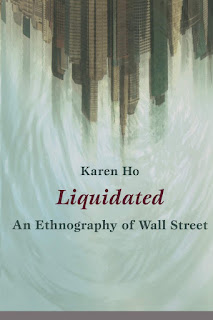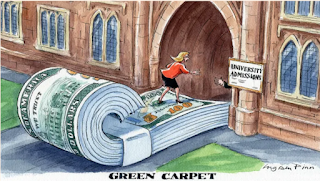Literature Review #5
Ho, Karen. Liquidated: An Ethnography of Wall Street. Duke University Press, 2009
Summary:
In the first chapter “Biographies of Hegemony” of her book Liquidated, Ho analyzes the biographies of Wall Street workers, documenting their backgrounds and revealing how they understood their positions. Ho provides the readers with a close look on the justification of power and privilege based on academic “smarts.” She argues that the elitism, the empowerment, and the hard work are exploited to legitimate and promote Wall Street’s superiority. She identifies Wall Street’s global dominance as being heavily dependent on the discourse and practice of everyday in attracting and defining smartness, which enables the investment bankers to claim authority. She reveals the process of aggressive recruitment in Wall Street where Harvard and Princeton form the key recruiting grounds and undergraduates are told that they are the smartest of being at elite universities. In fact, Wall Street has become the obvious and safe destination for graduates of the Ivy League. Ho also collapses the myth of the powerful and meritocratic investment bank by exposing the internal hierarchies within them where workers are segregated spatially as well as by ethnicity, class, and university backgrounds.
Author:
Karen Ho worked at an investment bank and immersed herself in investment banking circles from 1996 to 1999 to investigate the everyday experiences and ideologies of Wall Street investment bankers. Her objective is to understand how investment bankers actively shape the markets by examining the process through which they produce dominant logics of the Wall Street norms through daily cultural practices. Her analysis draws upon a combination of interview through alumni and work connections, participant observation, and shadowing at work and conference events. Her study brings valuable insights into how Wall Street firms are institutionally empowered to enact their worldviews and export their practices by priding themselves on skimming from the top of a very small number of elite universities.
Concepts:
- Smartness: Ho argues that “smartness” on the Wall Street has little to do with intelligence, but rather a function of “pedigree, competitive consumption, and heteronormativity” (52). The concept of a meritocracy based on “smartness” rewarded by high pay has narrowed the concept of success while legitimizing the deservingness of the elite workers.
- Culture of Smartness: The situated practices and ideologies produced by the Wall Street that serve to confer authority, legitimacy, and worthiness of the workers and the investment banks. Wall Street’s recruiting model which emphasizes elite educational credentials is one the main ways that nurture the culture of smartness.
- Survival of the Smartest: The “survival of the smartest” stems from a sort of Darwinist perspective of “survival of the fittest” which suggests that organisms best adjusted to their environment are the most successful in surviving and reproducing. Just like Darwin’s theory, “Survival of the Smartest” suggests that the one labelled the smartest is defined as the best and hence the fittest to the elite firms, whereas those who don’t meet the criteria for smartness are prone to fail.
Quotes:
“I found not only that most bankers came from a few elite institutions, but also that most undergraduate and even many graduate students assumed that the only ‘suitable’ destinations for life after Princeton—the only sectors offering a truly ‘Princeton-like job’—were, first, investment banking, and second, management consulting” (Ho, 43-44).
“It is hardly surprising, then, that the much-mythologized field of investment banking often presents itself as the solution to anxieties about postgraduation life” (Ho, 53).
“Implicit in this transformation from undergraduate to investment banker is Wall Street’s notion that if students do not choose Wall Street post-graduation, they are somehow ‘less smart,’ as smartness is defined by continued aggressive striving to perpetuate elite status” (Ho, 56).
“Being the best and the brightest, especially for college graduates, does not mean possessing actual technical skills, a background in finance, or even a specific aptitude for banking. Instead, Princeton and Harvard recruits bring to the table just the right mix of general qualities and associations: they are not too technical or geeky (MIT), not too liberal (Yale), not too far away (Stanford), and their universities carry more historical prestige than the remaining Ivies (Brown, Columbia, Cornell, Dartmouth, University of Pennsylvania)” (Ho, 64).
Value:
The first chapter of the book Liquidated, is valuable to my research as Ho shows how an opaque field of investment banking is considered as a solution to anxieties of the Ivy League students. Wall Street has become a badge of meritocratic success, hence, the obvious destination for the graduates. The image as “the best and the brightest” is also key to my research in understanding the hubris of the Wall Street and the meritocratic elites who remain to internalize the belief that they are among the smartest and the hardest working individuals in America.


Comments
Post a Comment